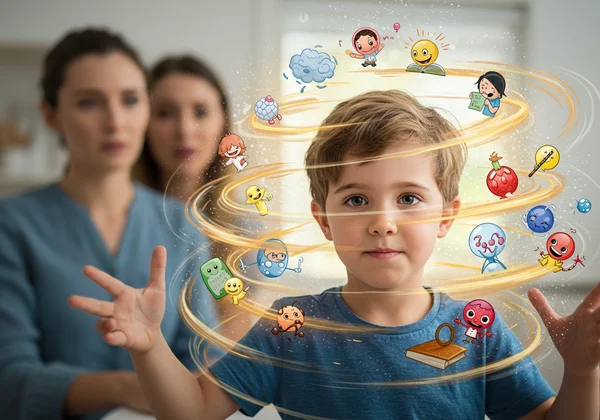Does My Child Have ADHD? Kids Quiz & Parent Guide
July 27, 2025 | By Julian Navarro
Is your child easily distracted, constantly on the go, or struggling with focus in school? As a parent, observing these behaviors can be deeply concerning, leading you to wonder if it might be Attention-Deficit/Hyperactivity Disorder (ADHD). This guide is designed to help you understand common signs, distinguish them from typical childhood energy, and provide a clear first step with our free adhd quiz for kids. Navigating these questions can feel overwhelming, but you're not alone. So, does my child have adhd quiz searches have brought you here for a reason: you're seeking clarity and support.
Here, we'll explore the potential indicators of ADHD in children at different ages and show you how a preliminary screening tool can be a valuable starting point. Remember, this information and our online quiz are here to offer initial insights. They are not a substitute for a professional diagnosis from a qualified healthcare provider. To begin understanding, start your journey here.

Recognizing Signs of ADHD in Children by Age
ADHD presents differently depending on a child's developmental stage. What might look like hyperactivity in a preschooler could manifest as inattention in a school-aged child. Understanding these nuances is key to identifying potential patterns that may warrant further exploration.
Early Indicators: ADHD Symptoms in Preschoolers (Ages 3-5)
In very young children, it can be challenging to distinguish ADHD symptoms from typical toddler or preschooler behavior. However, certain signs may be more consistent and intense than in their peers. Parents often notice extreme restlessness; the child may seem to be "driven by a motor," unable to sit still even for short activities like stories or meals. They might also exhibit significant impulsivity, such as grabbing toys from others, interrupting conversations, or engaging in risky behaviors without thinking.
While all preschoolers are energetic, a child with potential ADHD might have trouble with activities that require quiet focus and may switch from one unfinished activity to another in rapid succession. Difficulties with following simple instructions, not due to defiance but seeming forgetfulness, can also be an early sign. Answering a childhood adhd quiz based on these observations can help organize your thoughts.

Navigating School Years: What ADHD Looks Like in Ages 6-12
As children enter elementary school, the demands for focus and organization increase, often making ADHD symptoms more apparent. The academic and social structure of school can highlight challenges that weren't as obvious before. Teachers may be the first to report issues.
Key signs in this age group often fall into three categories:
- Inattention: This includes difficulty sustaining attention in tasks or play, making careless mistakes in schoolwork, seeming not to listen when spoken to directly, and being easily distracted by external stimuli. They may often lose necessary items like homework, pencils, or books and struggle with organizational skills.
- Hyperactivity: A child might fidget with hands or feet, squirm in their seat, or leave their seat when remaining seated is expected. They may run or climb in situations where it is inappropriate and often have trouble playing or engaging in leisure activities quietly.
- Impulsivity: This can manifest as blurting out answers before questions are completed, having difficulty waiting for their turn, and interrupting or intruding on others' conversations or games.
Observing these patterns consistently across different settings (home and school) is a crucial part of the picture.

Why Consider Our Online ADHD Quiz for Kids?
When you're filled with questions and concerns, finding a reliable starting point is essential. An online screening tool can serve as that crucial first step, helping you organize your observations and decide what to do next. It provides a structured way to look at your child's behaviors.
The Benefits of a Preliminary Online Assessment
Taking a preliminary online assessment offers several advantages for worried parents. First, it’s accessible and private; you can complete it from the comfort of your own home at a time that works for you. Our quiz is completely free and confidential, ensuring your family's privacy is protected.
Second, it provides immediate, structured insights. Rather than a jumble of worries, the quiz helps you consider specific behaviors based on established criteria like the DSM-5. The results can give you a clearer, more organized perspective on whether the signs you're seeing align with common ADHD traits. This can empower you for a more productive conversation if you choose to see a specialist. Why not get some clarity now?

How Our Kids ADHD Quiz Provides Insights for Parents
Our adhd self-assessment quiz is designed for parents to answer based on their observations of their child. The questions cover a range of behaviors related to inattention, hyperactivity, and impulsivity. As you go through the quiz, you'll reflect on how frequently your child displays certain behaviors in different environments.
Upon completion, you'll receive an instant summary of your responses. This summary highlights potential areas of concern, giving you a clearer understanding of your child’s specific challenges. It is not a diagnosis, but rather a personalized, informational tool to guide your next steps. For those seeking deeper understanding, we also offer an optional AI-powered report with more detailed analysis and suggestions. You can try our free tool to see how it works.
Beyond the Quiz: Next Steps for Your Child's Well-being
A high score on an online quiz can feel overwhelming, but it's important to view it as an initial indicator, not a definitive diagnosis. It simply helps point you toward the next steps. The goal is to gather information to support your child’s well-being, and the quiz is just one part of that process.
When and How to Seek Professional Evaluation for ADHD
If the quiz results indicate potential ADHD characteristics and your own observations consistently align with this, it may be time to seek a professional evaluation. This is especially true if your child's behaviors are negatively impacting their school performance, social relationships, or family life.
Start by scheduling an appointment with your child's pediatrician or a family doctor. They can conduct an initial assessment and rule out other possible causes for the behavior, such as vision or hearing problems. If needed, they can refer you to a specialist, such as a child psychologist, psychiatrist, or developmental pediatrician, who can perform a comprehensive diagnostic evaluation.

Preparing for Your Child's Consultation: What to Discuss
Being prepared can make your consultation much more effective. Before the appointment, gather specific information and examples. Your completed online ADHD quiz results can be a great starting point for this discussion.
Here’s a checklist of what to bring:
- A list of the specific behaviors that concern you.
- Examples of when and where these behaviors occur.
- Information on how long you've noticed these patterns.
- Feedback or reports from your child's teachers or caregivers.
- Any relevant family medical history.
Sharing this detailed information will give the healthcare professional a comprehensive view of your child’s situation, leading to a more accurate assessment.
Taking the First Step: Gaining Clarity for Your Child
It's natural to have questions about your child's development, and seeking answers is a key part of parenting. If you're concerned about ADHD, taking proactive steps to find answers is the most supportive thing you can do. Understanding the signs and knowing where to turn for help can transform worry into action.
Our free and confidential online ADHD quiz is here to provide that initial clarity. It’s a simple, responsible first step toward understanding your child’s unique needs and empowering you with the knowledge to support them effectively.
Disclaimer: This quiz is an informational screening tool and not a substitute for a professional medical diagnosis. Please consult a qualified healthcare professional for a comprehensive evaluation.
Frequently Asked Questions About Childhood ADHD & Quizzes
Does my child have ADHD if the quiz results are high?
A high score on our quiz suggests that your child exhibits several behaviors associated with ADHD and that a professional evaluation is recommended. However, the quiz is a screening tool, not a diagnostic one. Only a qualified healthcare professional can accurately diagnose ADHD after a comprehensive assessment.
What are common signs of ADHD in a 5-year-old?
In a 5-year-old, common signs often relate to hyperactivity and impulsivity. This can include constant motion, inability to sit still for activities like circle time, interrupting others frequently, and having difficulty waiting for their turn. They may also show signs of inattention, such as being easily distracted or not seeming to listen.
What should I do after my child takes an ADHD quiz?
After taking the quiz, use the results as a starting point for discussion. If the results indicate potential ADHD traits, consider scheduling an appointment with your child’s pediatrician. Share the results and your specific observations to determine the best next steps, which may include a referral to a specialist. Taking our ADHD online quiz is a great way to prepare for this talk.
Is the Kids ADHD Quiz free and confidential?
Yes, absolutely. Our core free adhd quiz is offered at no cost. We are committed to protecting your privacy; all your responses are confidential and your data is secure. Our goal is to provide a safe and accessible resource for parents seeking answers.